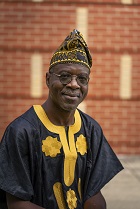ASCL Seminar: Africa's Second Struggle for Freedom: What's decolonisation got to do with it?
Primary tabs
 Removal of Cecil Rhodes' statue at the University of Cape Town, 2015. Photo credits: Desmond Bowles (via Wikimedia Commons).
Removal of Cecil Rhodes' statue at the University of Cape Town, 2015. Photo credits: Desmond Bowles (via Wikimedia Commons).
The freedom of ordinary Africans and their ability, at the individual level, to control their lives, lead lives marked by inviolate dignity of their persons and concurrent limits on the reach of governments and of their fellows in their daily lives, must never be up for negotiation. Indeed, this ought to be the standard by which we judge the legitimacy and attractiveness of any government and the quality of any of our societies in the continent as it increasingly is the case in other parts of the world that are also embracing struggles similar to what Olúfẹ́mi Táíwò (Cornell University) calls Africa's second struggle for freedom.
As Táíwò has written in Against Decolonization, Africa is not alone in this connection at the present time. The difference is that those who are dominated by what he calls the metaphysics of difference that underpins an unhelpful cathexis to identity are loathe to see these similarities and, as a result, leave themselves without help from the experiences of other humans both in the past and at present. What’s decolonisation got to do with it? The basic principles for which Africans are immolating themselves, risking life and limb in standing up to dictatorial/authoritarian regimes and generally insisting that they, too, must be free are shared with other oppressed humanity from Denmark to Myanmar, from Eswatini to China. The discourse on decolonisation is a distraction from this much needed struggle.
Read an interview with Olúfẹ́mi Táíwò in NRC (in Dutch, 23 June 2023).
Read Germa Seuren's Library Highlight about Against Decolonization.
Speaker
 Olúfẹ́mi Táíwò is Professor of African Political Thought and current Chair at the Africana Studies and Research Center, Cornell University, Ithaca, NY, U.S.A. His research interests include Philosophy of Law, Social and Political Philosophy, Marxism, and African and Africana Philosophy. Táíwò is the author of 'Legal Naturalism: A Marxist Theory of Law' (Ithaca: Cornell University Press, 1996; Paperback 2015), (Chinese Translation, 2013); 'How Colonialism Preempted Modernity in Africa' (Bloomington: Indiana University Press, 2010); 'Africa Must Be Modern: A Manifesto' (Ibadan: Bookcraft, 2012), (North American Edition, Bloomington: Indiana University Press, 2014), 'Can a Liberal Be a Chief? Can a Chief Be a Liberal? On an Unfinished Business of Colonialism' (Chicago: Prickly Paradigm Press, 2021), and 'Against Decolonisation: Taking African Agency Seriously' (London: Hurst, 2022). He was joint editor with Olutoyin Mejiuni and Patricia Cranton of 'Measuring and Analyzing Informal Learning in the Digital Age' (Hershey, PA: IGI Global, 2015). His writings have been translated into French, Italian, German, Chinese, and Portuguese. He has taught at universities in Canada, Nigeria, Germany, South Korea, and Jamaica.
Olúfẹ́mi Táíwò is Professor of African Political Thought and current Chair at the Africana Studies and Research Center, Cornell University, Ithaca, NY, U.S.A. His research interests include Philosophy of Law, Social and Political Philosophy, Marxism, and African and Africana Philosophy. Táíwò is the author of 'Legal Naturalism: A Marxist Theory of Law' (Ithaca: Cornell University Press, 1996; Paperback 2015), (Chinese Translation, 2013); 'How Colonialism Preempted Modernity in Africa' (Bloomington: Indiana University Press, 2010); 'Africa Must Be Modern: A Manifesto' (Ibadan: Bookcraft, 2012), (North American Edition, Bloomington: Indiana University Press, 2014), 'Can a Liberal Be a Chief? Can a Chief Be a Liberal? On an Unfinished Business of Colonialism' (Chicago: Prickly Paradigm Press, 2021), and 'Against Decolonisation: Taking African Agency Seriously' (London: Hurst, 2022). He was joint editor with Olutoyin Mejiuni and Patricia Cranton of 'Measuring and Analyzing Informal Learning in the Digital Age' (Hershey, PA: IGI Global, 2015). His writings have been translated into French, Italian, German, Chinese, and Portuguese. He has taught at universities in Canada, Nigeria, Germany, South Korea, and Jamaica.

